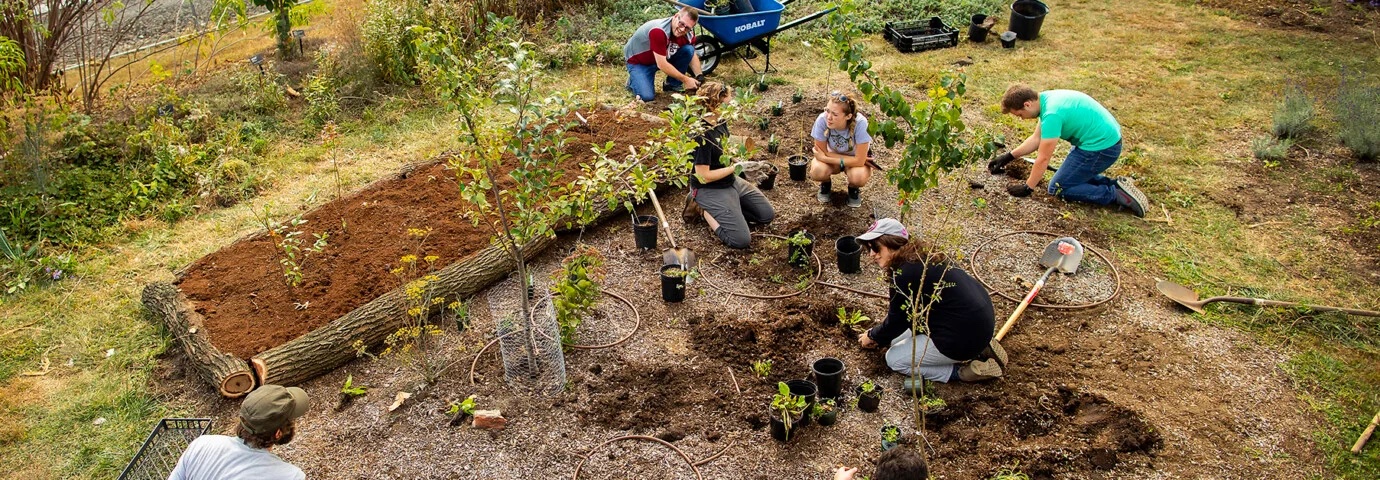Ecotopian Tools for the Academy: "FARM: Food, Agriculture and Regional Land Management”
April 29, 2024
Welcome to the third and final installment in our series of student proposed “Ecotopian Tools for the Academy!”
From production to sourcing, consumption, and cultural perceptions, several students were interested in potential tools regarding sustainability and food. Sowmya Vaidyanathan,'s proposal focuses on bridging the gap between how we think about the food on our plate and the intricate web of labor, resources, and energy that brings it to us.
Curious to learn more? Read the entire series, starting with our exploration of “Environmental Injustice and the Philadelphia School District” Course and "Meatless Mondays in Penn’s Dining Halls"
Proposed by Sowmya Vaidyanathan
Universities all over the country report food waste as an imminent problem. In fact, according to the National Resource Defence Council, around twenty two million pounds of food is wasted annually on college campuses across the United States. I believe that food waste is a symptom of a larger issue; the disconnect between food production systems and consumption, where food on one’s plate is not associated with the time and labor required to produce it. In other words, this issue of food waste is an example of a disconnect between humans and nature. My ecotopian tool addresses this issue by having students be actively involved in the production of their food, thereby creating a dining environment that is built for and by the Penn community.
This tool will be carried out through a two credit module about food, farming, and sustainable agriculture, and a partnership with Penn Park Farm and Penn Dining. The program (tentatively called FARM) aims to first build a more robust network of University of Pennsylvania’s food gardens, including expanding Penn Park Farm and creating smaller kitchen gardens on and around campus to grow seasonal and fresh produce. To begin with, every residence hall would have their own kitchen garden and Penn Park Farm itself would be expanded to cover the Penn owned lands nearby that currently aren’t in use. Then, with a partnership with Penn Dining, perhaps a food item or a menu could be created with the produce grown in these gardens on a weekly or biweekly basis. In the long run, similar to areas like the Morris Arboretum, Penn could build off-site gardens, or work with the Philadelphia Parks and Recreation department to create more community grow banks.

Penn Park Farm grows thousands of pounds of organic produce annually— right on UPenn's campus.
This project requires heavy student involvement, on account of a two credit module that would be split over the course of a year. These modules would teach students how to get involved in food production; with the first course focusing on theory, planning and information about food systems around the world, and the second with students applying their knowledge and working in the gardens. Gardening and farming are instrumental in teaching students about the different multispecies connections required to create the food that is eaten. Moreover, this could also promote larger conversations about the intersections between environment, food and labor in the Anthropocene- particularly the need for more accessible food options through food forests and community food banks. This experience teaches students to care for the environment around them and be mindful of what they eat. At the very least, it creates an opportunity to grow more fresh produce on campus.
About the Author
Sowmya is an environmental activist and masters student in the department of Earth and Environmental Sciences at the University of Pennsylvania. She is interested in climate justice, environmental histories and multispecies interactions in and beyond South Asia. In the past, she's worked on developing climate action plans that actively involve young people and a series of zines based on environmental issues in India.
Sources
Image: https://cph.upenn.edu/penn-park-farm/
